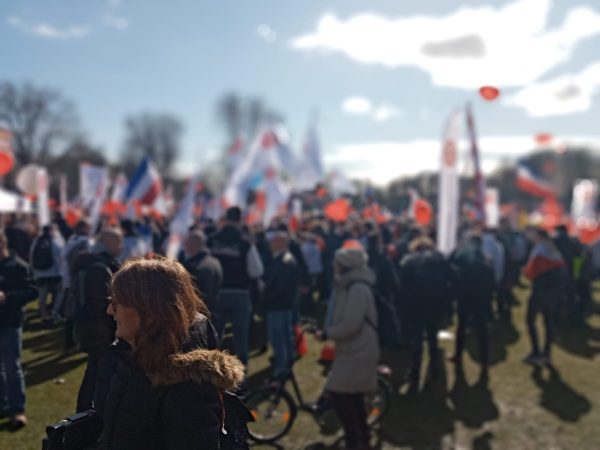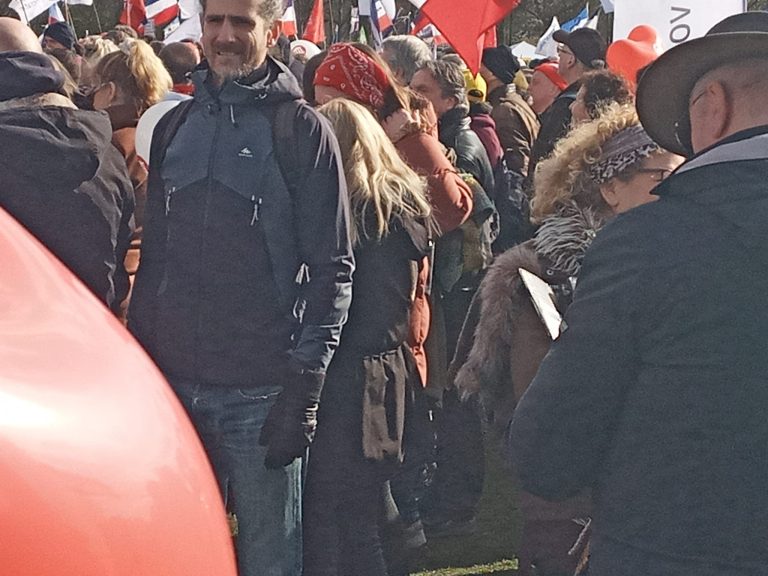THE HAGUE, Netherlands — Several thousand Dutch farmers demonstrated on Saturday, March 11, in The Hague, the Netherlands, against the government’s plans to nationalize a large number of farms. However, the protest stalled over a reluctant mayor, climate activists, and opposition leaders who wanted to hijack the initiative to suit their own political ends.
The farming industry of the Netherlands, one of the largest agricultural exporters in the world, has long been under fire as being the most polluting industry.
Not because of the unimaginable animal suffering involved in this multi-billion dollar industry, but rather because farmers are accused of causing acid rain, methane, nitrogen, and carbon dioxide emissions, and they are held responsible for the degradation of biodiversity.
However, angry tongues, such as those of opposition leader and Forum for Democracy (FvD) frontman Thierry Baudet claim that it is about vulgar land grabbing what the government is playing here in order to flatten the Netherlands and turn it into a large urban ghetto.
This would be done with the aim of preparing the country for the entry of many, mainly Ukrainian asylum seekers. Meanwhile, Dutch agricultural production and know-how are planned to move to Ukraine.
Success
You are now signed up for our newsletter
Success
Check your email to complete sign up
It was a promising initiative, the Farmers Defense Force’s (FDF) farmers protests against the plans to start reducing the number of farms by a third because they would not meet the new nitrogen emission requirements.
Resistance meets resistance
However, government opposition began the previous week when Mayor Jan van Zanen ruled that only 25,000 people would be allowed to attend-not the 100,000 the organization had hoped for.
Nor were thousands of tractors allowed to enter the grounds, but ultimately only two. This, reportedly, was because otherwise, the order could not be maintained.
Van Zanen argued that he held the right to demonstrate very high but that he could not help being so strict because that same day, there was an Extinction Rebellion demonstration that would occupy the A12 freeway, the aorta to and from The Hague, for five hours and thus require the full deployment of the police.
The mayor had also enlisted help from the army in support. This, fortunately, did not have to be deployed anywhere, but it did set the atmosphere and ultimately showed who’s the boss in The Hague.

When the demonstrators wanted to enter the Zuiderpark in The Hague on Saturday morning with their all-terrain vehicles, the electronic roadblocks were still activated, much to the chagrin of the activists who had spent weeks of preparation in close consultation with the municipality.
One activist could not keep his patience and forced a fence with a bulldozer, allowing a number of trucks to enter the grounds despite the ban.
READ MORE:
- Flemish Nitrogen Emissions Cuts Plans Spur Massive Farmers’ Protests
- Thousands of Dutch Farmers Protest Government’s Plan to Reign In Emissions
- Dutch Farmers Flex Their Muscle but Can’t Make a Fist After Government Talks
- Netherlands to Confiscate 3,000 Farms Under Guise of Saving the Environment
Later that day, the man was arrested by six police officers who sat on top of him and used a neck pinch and pepper spray on him, even though the man was already restrained and did not resist.
Blue-White-Red
When the demonstration finally got underway, a few thousand people showed up, and a motley melee of action groups wanted to bring attention to various cases of abuse, such as the far-reaching Covid-19 emergency measures, ritual satanic child abuse and earthquake damage caused by natural gas extraction to residents of the northern province of Groningen.
Otherwise, it was a convivial day with several speakers, dance numbers, and a lot of heart-shaped helium balloons. There were also many inverted national flags flying; blue-white-red as a protest against the official flag display, which is red-white-blue.
But above all, there was nice pomp by a number of opposition political parties who cleverly used the crisis and general discontent to show off their saving grace from the current crisis.
‘Vote them out!’
The event was dominated by the upcoming Provincial Council elections and thus the composition of the Upper House (the Senate) on Wednesday, March 15.
“Vote them out!” was the generally shared slogan that the various speakers carried.
There was no mention that the Provincial Council elections have zero influence on the composition of the Lower House (House of Representatives), which determines everything regarding lawmaking.
And the fact that the elections certainly have no effect on the government cabinet, which is increasingly pursuing its own agenda and seems to have stopped consulting the Lower House altogether in its decision-making.
In all, it will take more than heart-shaped helium balloons and pretty slogans to stop the planned crush of the Dutch farming industry.

















